Table of Contents
Do Extensions Affect Torque Wrench Accuracy:
The short answer is no, extensions do not affect torque wrench accuracy. That is if they’re used properly, and you’re using your torque wrench correctly. In order to get an accurate reading from a torque wrench, you must always place your hand in the correct spot, maintain the torque wrench parallel to the fastener at all times, and avoid any wobble or universal (swivel) sockets. It also very important to use a high-quality torque wrench that has been calibrated recently.
Torque Wrench Myths Busted Here, But First A Pop Quiz For You
You are using your 1/2″ drive click type torque wrench for your lug nuts on your fresh 1987 Honda Accord.
You already googled the right lug nut torque values. Sweet! An easy to read table:
Ok, perfect you set your brand new awesome torque wrench you bought to 80ft-lbs. You already have an awesome torque wrench because you read my article on what torque wrenches to buy.
Then, you grab your 6 1/2″ extension so that you can clear your new rims. You start tightening the lug nuts in a star pattern as you learned on youtube when someone walks up behind you.
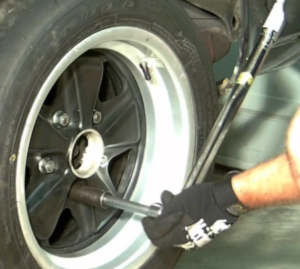
He is much older and seemingly wiser than you, and you’ve seen him in his driveway working on all his cars. You hope you’re doing it right as he watches, when he suddenly spurts out.
“Did you adjust your torque values with that extension?” he asks smartly.
“Wait, what?” you reply backing away from what you were doing.
“Using an extension or an adapter on a torque wrench changes the torque values. You probably just way over torqued your wheels” he states as fact.
“But, hey I got to go, just be careful you don’t break any lug bolts or lose a wheel on the freeway. That happened to a new tech at my shop that used an extension on his torque wrench, customer almost died.”
He laughs as he walks away, content with his helpfulness. Ok, maybe this kinda rude neighbor doesn’t exist. But people giving out bad car repair advice like it is candy is nothing new.
Anyone that has worked on their car in their own driveway has dealt with the professional technician neighbor coming by to drop some wisdom.
You take a step back and reevaluate why you even bought a fixer-upper car in the first place.
How did you ever think you’d be able to actually work on it? Even something simple you seem to mess up. Gosh, you think, I better quit while I am ahead. I should just drive over to the local Wal Mart and have them torque the wheels.
Your friend told you to take the extension off and just try your best not to scratch up your sweet new rims.
You follow his advice.
That night after you drive home defeated with your new scratched up sweet rims, and bloodied knuckles, you decide to do some research.
You google “Using an extension on a torque wrench.”
You’re blown away by what you find. Had everything you learned about respecting your elders been false?
The physics behind torque wrenches and extensions:
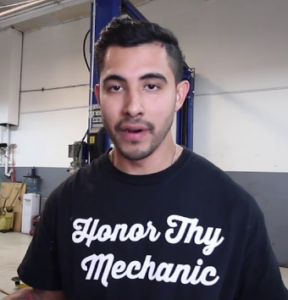
Is it really the biggest myth about torque wrenches to ever be perpetrated by everyone that has worked on cars, myself included?
Yup. And it literally continues to be a source of heightened debate in the online community. Right behind Synthetic versus Regular Oil, Using RTV correctly, or putting Anti Seize on modern spark plugs.
Buckle up. Sit back, and enjoy the ride.
Turns out that the physics behind torque and torque wrenches do not agree with your friend’s statement. I must apologize for also telling people this over the years.
Extensions and step-down adapters (1/2″ to 3/4″ etc) do not change the torque value applied. However, we must take a deeper look to really understand the physics behind torque, using torque wrenches, and how to be a smart DIYer / technician.
The biggest myth when using torque wrenches is that using adapters and extensions changes the applied torque value:
Extensions and Adapters do not change the applied torque as long as some general principles are understood/used.
“No, it won’t reduce the torque. Torque is equivalent to radius x force. As long as A, the force is applied at the same distance from the nut/bolt that you’re tightening and B, it’s applied in the same direction then you’ll be applying the same torque. An adapter (especially so short) shouldn’t have a noticeable effect on the direction that you’re applying the force. Luckily, you don’t have to measure your radius(foot) x force(lbs) because the torque wrench will do that for you.
The one concern with using more than a couple of adapters is that the possibility of introducing a significant change in the angle between the torque wrench and bolt/nut face becomes more plausible.
The torque wrench should be parallel to the face of whatever you’re torquing for the measurement to be accurate.” Read more here.
Adapters and Extensions if used properly do not affect torque values:
For the rest of the discussion, you can think of adapters and extensions as the same concept. Going from 1/2″ drive to a 3/8″ socket does not change the torque value simply because of stepping down the drive size. However, it is important to use high-quality adapters/extensions as this kind of twisting forces can break/shatter sockets.
Some educational videos I have picked through and chosen that illustrate this point very well. Remember we are talking about extensions and adapters that do not swivel or universals.
You will see in the video but if your torque wrench has certain types of universals in line and the torque wrench or extensions aren’t kept straight then the force will change.
Here just watch it is easier to see than to try to visualize it:
& More In Depth:
& Even More To Prove The Same Points:
Where you place your hand on the torque wrench matters the most:
Why does your hand position affect torque wrench values:
Any force that is applied that isn’t at a 90-degree angle will change the applied torque to the fastener. Watch the videos above to see this in action.
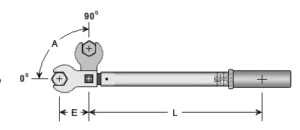
Increase the length of the torque wrench, and you change the applied torque.
A.k.a crows feet (as shown in the image on the left) or extensions used in order to reach hard to reach fasteners in the engine bay. Watch this video (cued up for you) where he uses another type of extension that lengthens his torque wrench. Therefore, he must recalculate the torque values.
However, the torque values will not be affected if you keep the extension at a 90-degree angle.
Looking at the image above it is easier to visualize. When the crows foot is pointed straight out it increases the length of the torque wrench and therefore changes the torque value.
However, when it is at the 90-degree angle it is the same distance from the bolt to the end of the handle (L) is the same. Therefore the torque value is NOT EFFECTED.
If It changes the effective length of the torque wrench then it will change the torque value. If you keep it at 90 degrees to the torque wrench then your torque readings will be the same and consistent. It DOES NOT matter how long your extension is, only that it is kept at a 90-degree angle and the effective length of the torque wrench isn’t changed.
Using Cheater Bars on Torque Wrenches (Especially Click Type):
Avoid doing this at all costs. It will change the torque reading (on a click type wrench) I am not sure on a nonclick type wrench. From CDI a high-level torque wrench company on their website, under education, (link here) they say specifically:

Also, every manual for every torque wrench tells you to put your hand in the grip area.
If you move your hand up and down the torque wrench you will affect the torque rating.
Here is the part in the video where he shows how a cheater bar is impacting the torque values:
Since this is just good practice, I don’t care if it doesn’t effect a digital torque wrench (IT DOES ON A CLICK TYPE) therefore just don’t do it. You shouldn’t need to anyways.
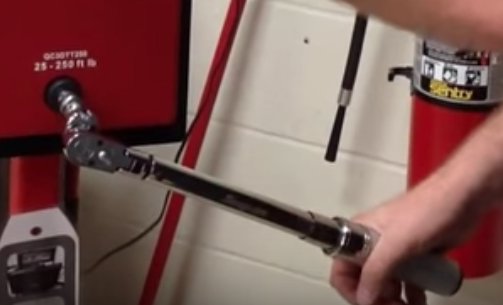

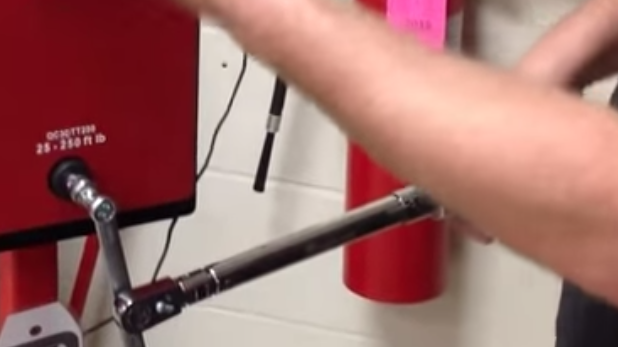
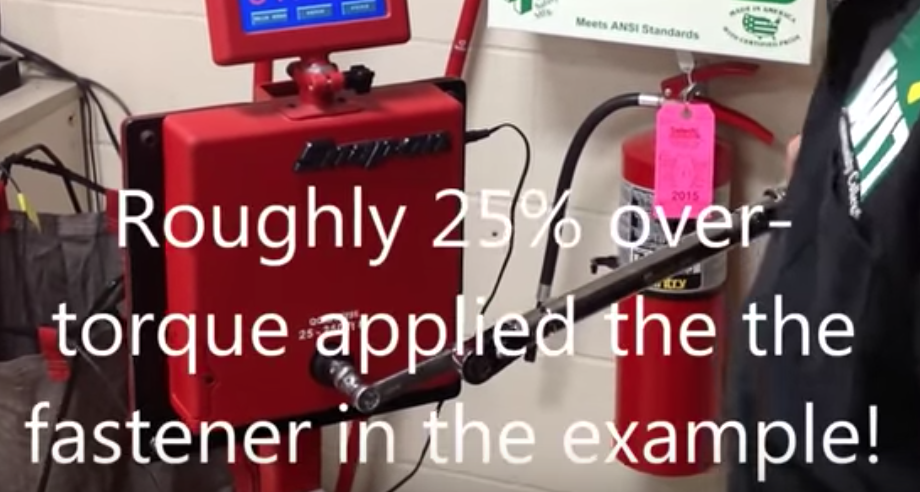
The Main Thing People Mess Up Is Not Using A High-Quality Torque Wrench:
A torque wrench should be calibrated every year at least in the automotive world.
Treat it like a glass egg, if you drop it should be checked for its calibration. Does that really apply if you’re just doing lug nuts? No. If you don’t feel any noticeable difference, and you know it was right before, then it doesn’t really matter if you’re torquing lug nuts with a margin of error. You’ll be able to feel tight / know if it isn’t right.
It gets really important however when you’re rebuilding engines, torquing really specific bearings etc., that is when all these concepts really come into play. Without a well calibrated torque wrench you may be way off, and the head gasket won’t hold up etc etc.
You can send it in, or call around dealerships in your area and ask the service guys if they can check your torque wrench / adjust it. It will likely cost more than if you bought a harbor freight special in the first place.
That is why I highly encourage you to at least get the next level up from harbor freight (if you can afford it).
I Asked Aviation Mechanics How Torque Wrenches Are Handled In Their Field:
The answer is pretty cool/enlightening to how important calibrated tools are in their field.
From a user on Reddit:
“Tool control is extremely important in aerospace. My company, for example, is in the process of doing away with personally owned tools. They bought crazy self-aware toolboxes from snap on that you need a badge to open and it scans the drawer after you take a tool out, keeping track of who has the tool and what plane they are working on.
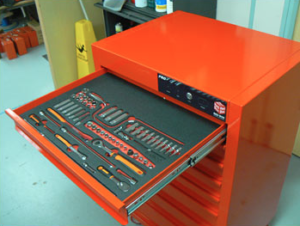
If any of those tools were used on a job I performed, I have to document what the tool ID number is and when it is next due for calibration.
Even before they got rid of personal tool boxes, no tools that require calibration could be owned by the individual, even if they were currently calibrated. They could only be owned by the company and kept in the tool room.
These are my companies policies, and they are a tad on the extreme side, but they aren’t that far off of the general idea.”
To see Snap On’s ATC Level 5 (highest level of security tool box in action):
What Torque Wrenches Do I Recommend in 2018:
To read more about torque recommendations (and towards the end) my recommendations in 2018 click here.
Now you can use a torque wrench like a boss, and not feel bad grabbing the largest extension you have and still getting those lug nuts perfectly tight!
In case you don’t feel like reading I have picked out my favorites for value/ durability/accuracy on Amazon:
All automotive technicians should first start with a 1/2″ Torque Wrench and breaker bar. (Buy this CDI one if you can afford it)
Then if you need to do much smaller exact stuff grab a 1/4″ Torque Wrench
And if you still find the need for a 3/8″ Torque Wrench pick that up after you have the 1/4 & 1/2″ drive.







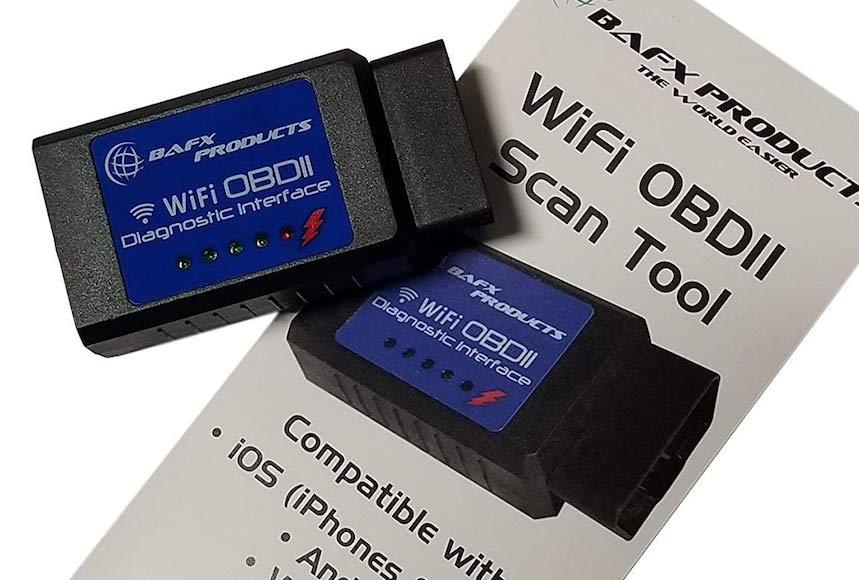
Pingback: 5 Annoying Things Beginner Mechanics Do - AGradeTools.com
Pingback: Beginner Mechanic Complete Tool List (With Photos & Descriptions) - AGradeTools.com